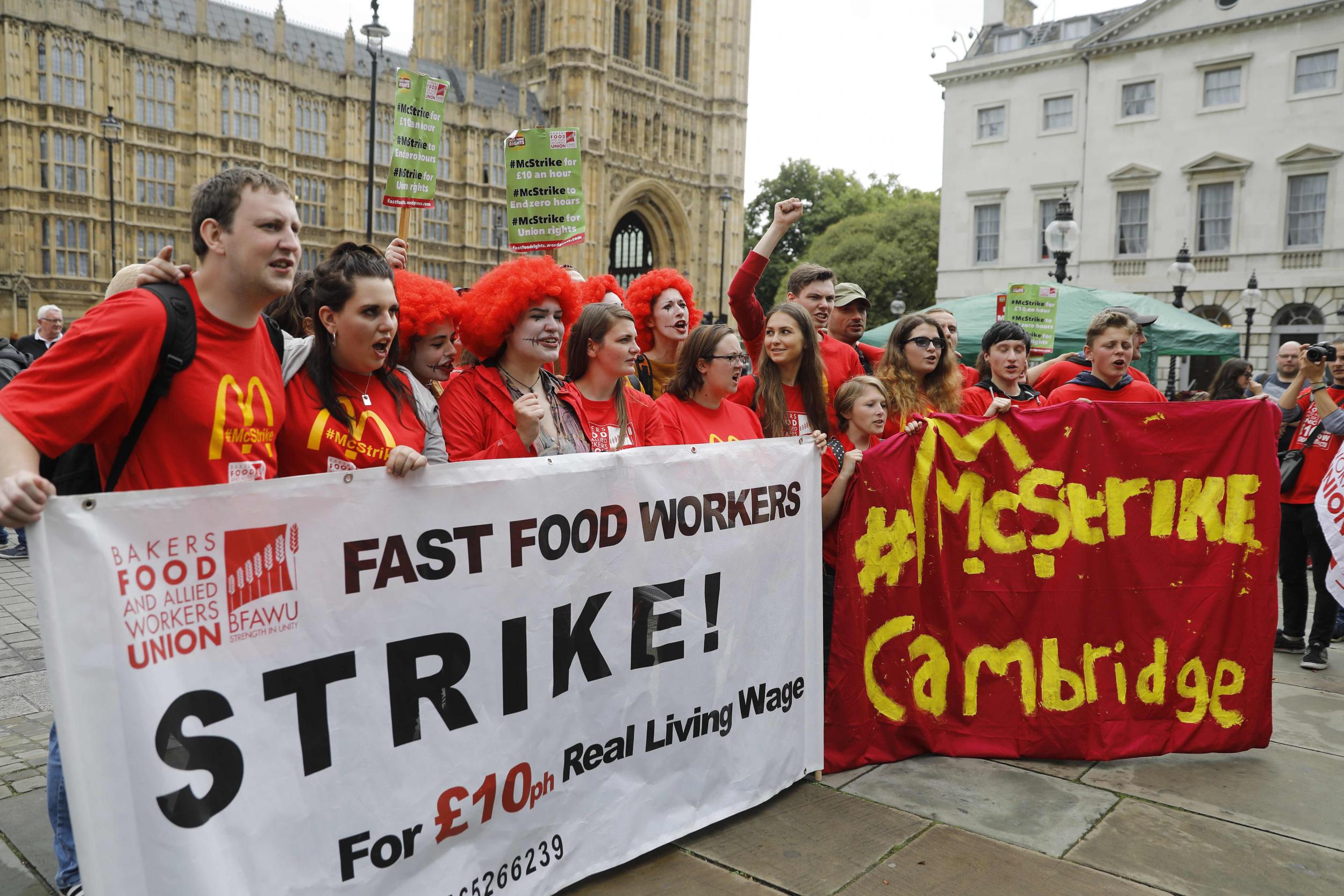No wonder low-paid workers have gone on strike – the Tories are blind to the horrors of modern working life
The Conservative mantra is that if you work hard in this country, you will get on fine. Not so for fast-food and zero-hours workers who barely make enough to survive in the first place


With the Tory party conference mercifully in the rear-view mirror, workers pushed to the limit by low wages have sought to fill the news vacuum by taking to the streets in what is being described as a “fast-food strike”. They are employed by a range of companies: McDonald’s, TGI Fridays, JD Wetherspoon, UberEats, and the chief issue they are protesting over is pay, or rather, the lack of it.
Their numbers are relatively small at the moment, but they are growing, and they are deserving of our full-throated support. If it means a few quid on the bill when we eat out, or (more to the point) if it means their employers accepting a little less profit, a little less bonus for the fat cats in charge, who never knowingly scrimp on their own salaries, then so be it.
Of course, it would be bad enough if low wages were the only issue affecting workers at companies like these. But they are not. Some of those named use zero-hours contracts. UberEats riders don’t even have that dubious benefit. They are held to be “self-employed” by the company they work for.
Critics, and I count myself among them, describe the form of “self-employment” they offer as bogus. It’s a dodge designed to escape the minimum wage, and the requirement to provide sick and holiday pay and other basic rights. (Britain’s employment rights are basic indeed by European standards.)
Defenders of zero-hours contracts or UberEats gigs argue that workers “value the flexibility” they offer. Except that the flexibility always seems to work best for the employer.
This latest evidence highlighting some of the problems with the zero-hours arrangement will be presented at the Austrian Central Bank in Vienna this week. There, three labour market economists, affiliated with the Centre for Economic Performance at the London School of Economics, will present a paper based on the results of an exhaustive survey of 19,000 zero-hours workers.
Among a plethora of numbers is the fact that some 44 per cent of them wanted more hours. Another troubling figure: around a third said they ended up doing unpaid work for their employers – the weekly average was seven hours – implying that the typical zero-hours worker is losing out on approximately £80.
The results chime with a TUC study that was published in December. Just 25 per cent of the workers it polled liked the arrangement they were on. So, what do the Conservatives, now back in their comfortable, air-conditioned offices, have to say to these people? Not much.
They commissioned Matthew Taylor to conduct a review into modern employment practices: what he came back with was, all things considered, pretty limp, with the main headline being the proposal to create a new category of employment; the “dependent contractor”.
But despite the lack of anything much to scare the children in its pages, it has basically been left to die in the long grass of Whitehall. This has left “gig” workers to rely on the courts, usually with the help of organisations such as the Independent Workers Union of Great Britain, which has had to resort to crowd funding to cover the legal costs of the cases it has backed.
It goes without saying that the young, and women, are overrepresented among those at the sharp end of this modern form of exploitation. It was memorably dubbed “the reincarnation of an ancient evil” by the Archbishop of Canterbury, who noted that some people see the “oppression of the employed as a virtue”.
He was right, because they do. They and their think tanks dribble on about “prosperity”, “free markets” and “non-intervention” when they extol the virtue of an economic system designed to favour only the wealthy few. They accused him of playing politics when he was actually playing decency.
What the archbishop did not say, but I will, is that many of them were to be found amongst the blue-rinsed hordes in Birmingham. Small wonder that the Tory party is held in such contempt by the young. Small wonder that it is held in contempt by anyone with a shred of decency.
The Conservative mantra is that if you work hard in this country you will get on. Its ministers regularly speak of their love and concern for Britain’s “hard-working families”. They even claim to support “social justice”.
The striking fast-food workers, the gig workers, the zero-hours workers, they all work hard, often damnably hard. But they don’t get on because they can’t. They make barely enough to survive on. They get exploited.
There is no social justice for them, which is why they have had to take to the streets to fight for it, and to the internet to crowdfund for it. Some of the more thoughtful Tories have started to worry about the glaring lack of support they enjoy among the under-fifties, as their old, bigoted and bitter members and voters prepare to meet their makers.
They are right to do so. But wringing their hands and offering trite homilies, before joining in with the communal flag-waving, isn’t going to cut it. The likes of the striking fast-food workers need action, not words, but there’s been precious little sign of it.
There’s precious little sign that the Tories even appreciate the issue.
Join our commenting forum
Join thought-provoking conversations, follow other Independent readers and see their replies
Comments